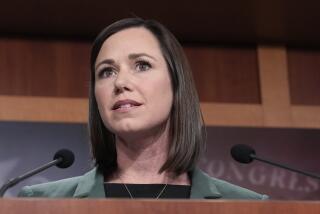Daschle, in Effort to Defuse Iraq Issue, Attacks Bush on Economy
- Share via
WASHINGTON — Struggling to change the nation’s focus from Iraq to issues closer to home, Democrats on Wednesday stepped up their attack on President Bush’s economic policies, accusing him of squandering the federal budget surplus, throwing people out of work and sending the stock market into the tank.
The sweeping broadside was launched by Senate Majority Leader Tom Daschle (D-S.D.) just a few hours after he had met with Bush over breakfast and somberly pledged bipartisan support for a U.S. challenge to Iraq.
“It takes leadership, not only with regard to international and foreign policy, but leadership here at home on economic policy as well,” Daschle said in a speech on the Senate floor.
Republicans dismissed the attack as a desperate political maneuver by Daschle that illustrates growing concern among Democrats that their agenda has been eclipsed by the debate about Iraq.
“He would like to change the subject,” said Senate Minority Leader Trent Lott (R-Miss.).
Daschle’s speech was the latest sortie in a larger battle between the parties to shape what issues are on voters’ minds in November’s election. While talk of war has spotlighted the foreign policy concerns that seem to play to GOP political strengths, Democrats are trying to return to domestic issues they believe work more to their political advantage: Social Security, controlling prescription drug costs, the economy.
The resulting tug-of-war has produced a climate in Congress that has been long on rhetorical flourish and short on legislative progress. Even though there is a crushing pile of unfinished legislative business before lawmakers--all 13 spending bills needed to finance government in the fiscal year that starts Oct. 1, a major reorganization of homeland security programs, a rewrite of the nation’s energy policy--both the House and Senate are moving at a snail’s pace.
The stalemates over spending bills have left the House so paralyzed that its Republican leaders are struggling to find bills to bring to the floor. Highlights this week have included measures to commend historically black colleges and name post offices--and partisan resolutions blaming the Senate for stalling welfare reform and a repeal of the estate tax.
In the absence of legislative action, the Capitol has become mainly a backdrop for news conferences and speeches seeking to set the tone for the fall campaign.
Democrats, having little stomach for fighting Bush on foreign policy issues, are trying to turn the heat up on other issues. They are pushing more spending to aid drought-stricken regions. They are circulating a petition to force House GOP leaders to take up a bill to speed the marketing of lower-cost generic drugs. The Campaign for America’s Future, a labor-backed group, this week is releasing a state-by-state analysis of the impact of the stock market drop on 401(k) retirement savings.
“When the Dow Jones goes down 350 points again and people’s 401(k)s become 201(k)s, their IRAs become IOUs [and] people get worried,” said Peter Fenn, a Democratic political consultant. “The front-burner issues are economic pocketbook issues.”
Michael Meehan, a senior advisor to Daschle and the Democratic National Committee, said that as the party tries to spotlight economic issues, “the calendar will help us.” He expects voters will be reminded of the economy’s woes when new unemployment statistics are released in early October and as investors begin to receive retirement account reports after Sept. 30 that reflect recent investment losses.
Daschle’s speech amounted to a compendium of the party’s complaints about Bush’s economic policy, consuming more than 30 minutes.
He blamed Bush’s policies for the loss of 2 million jobs, weak economic growth and a stock market plunge that amounted to a $4.5-trillion drop in value.
He complained that Bush and his fellow Republicans were offering no policies to remedy the situation, except for tax cuts.
“They have one economic all-purpose antidote for everything, and that is tax cuts, tax cuts largely dedicated to those at the very top,” he said.
But Daschle did not propose what many analysts believe logically follows his critique of Bush’s fiscal policy: a repeal of any part of the administration’s 10-year, $1.35-trillion tax-cut package that took effect last year.
Republicans argued that Daschle has little standing to complain about Bush’s leadership.
White House Budget Director Mitchell E. Daniels Jr. said Daschle “continues ... a pattern of total default of leadership.”
He termed Daschle’s speech “a very dispiriting and disappointing performance; I’m tempted to say ‘tantrum.’ ”
At the same time, Daniels acknowledged that because of the struggling economy, government tax receipts are coming in even lower than the White House’s reduced revenue estimates of just 10 weeks ago. But he said that White House projections for the budget deficit remain unchanged because of a slowdown in government spending.
*
Times staff writer Peter Gosselin contributed to this report.
More to Read
Get the L.A. Times Politics newsletter
Deeply reported insights into legislation, politics and policy from Sacramento, Washington and beyond. In your inbox twice per week.
You may occasionally receive promotional content from the Los Angeles Times.











